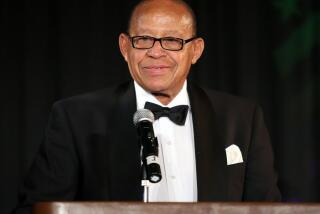Charles Rappleye, resolute investigative journalist, dies at 62
- Share via
Charles Rappleye, a resolute Los Angeles investigative reporter and editor who wrote critically acclaimed books about historical figures, has died at 62.
Rappleye, who battled cancer for six years, had been working on a book about little-remembered President Zachary Taylor when he died at home in Echo Park on Saturday.
The overlooked were his specialty — be they mafia figures, slave-trading Founding Fathers, mistreated gang members or downtrodden journalists.
He was especially interested in telling the stories of the overlooked of Los Angeles, such as a gang member targeted for blowing the whistle on crooked cops. In 2002, he recounted in the L.A. Weekly how Carlos Oliva Menjivar was “charged three times with resisting arrest, once after four officers manhandled him in his wheelchair, repeatedly slamming his head against a metal door frame.”
Rappleye castigated the Los Angeles Times in 1996 for trying to discredit a controversial series by journalist Gary Webb on the roots of the L.A. crack-cocaine epidemic, and used the pages of the Weekly to build on Webb’s work.
“It wasn’t just about a good story with Charlie. He wanted to root out wrong,” said Sue Horton, a senior editor at Reuters and a former editor in chief at the L.A. Weekly.
Born in Texas in 1956, Rappleye grew up in Cambridge, Mass., where he captained a top-rated high school rowing team, his brother Tim said. At the University of Wisconsin in Madison, he worked on the college paper and majored in economics, graduating in 1978. After moving to California, he became editor of the weekly Santa Barbara News & Review. He earned a master’s degree in professional writing at USC in 1988.
His first book, published in 1991, “All American Mafioso: The Johnny Rosselli Story,” chronicled the life of a mobster who reached into Hollywood.
Rappleye worked for the L.A. Weekly as news editor, reporter and writer from 1994 to 2003, during the heyday of its investigative journalism. He helped break open, along with The Times, the Rampart police-corruption scandal.
Former Times investigative reporter Scott Glover described Rappleye as “a dogged, tenacious reporter whose slightly disheveled, Columbo-like appearance made him the sort of guy people didn’t see coming.
“It made him a formidable competitor,” said Glover, who now works for CNN. “I opened up the L.A. Weekly more than once to see his byline above a story we wished we’d done or one that we had in the works but had yet to publish. Put another way, that’s called getting beat.”
Rappleye next turned to writing historical biographies, beginning with “Sons of Providence: The Brown Brothers, the Slave Trade, and the American Revolution,” about the founders of Brown University — and the brothers’ conflict over the slave trade. The university made the book — which won numerous prizes — required reading for incoming freshmen in 2012. Rappleye also wrote books about Robert Morris, the financier of the American Revolution, and Herbert Hoover.
Just over a decade ago, he helped Tulsa Kinney, his wife of 15 years, launch the L.A. art magazine Artillery.
In addition to Kinney, Rappleye is survived by his mother, Ann Crompton; his children, Dexter and Kelly; and their mother, Gale Holland, his first wife, who is a Times reporter.
Twitter: @howardblume
More to Read
Sign up for Essential California
The most important California stories and recommendations in your inbox every morning.
You may occasionally receive promotional content from the Los Angeles Times.














